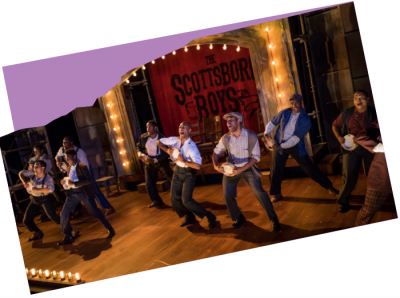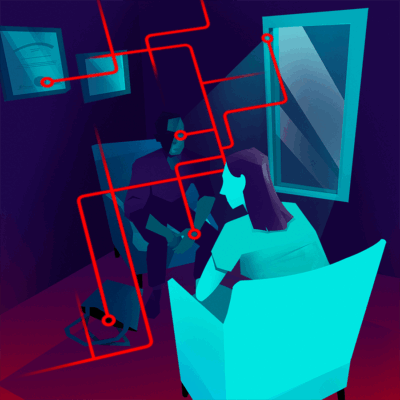Your donation sets the stage for a new season of Boston's most intimate, entertaining and provocative plays and musicals. Our shows make powerful connections with our audiences-- and they are only possible because of you.
An Interview with Director Monica White Ndounou
An Interview with Director Monica White Ndounou
SpeakEasy: What attracted you to this project? Why did you want to direct Pass Over?
Monica White Ndounou: When the Front Porch Arts Collective reached out to me to direct this show I had not yet seen it or read the play. I read it a few times, thinking about the various plays being written during our current moment, (i.e. the Black Lives Matter movement which is part of a continuum of Black liberation movements), I wanted to explore the possibilities of using the Black American acting traditions that I am writing about in my book to center Black artists and audiences.
SPK: What have been some of the most challenging and most
joyful things about bringing this story to the stage?
MWN: Collaborating with these artists (playwright, performers, creative team) to bring this story to Boston-area audiences has been very rewarding. The two major challenges are recognizing that we are working in a historically inequitable system that virtually ensures that stories like this are not developed in Black theatres, and that the range and depth of experiences recognized by Black audiences have not always been consistently reflected on Boston-area stages. As a result, any productions of such plays are most likely produced for predominantly white audiences that may assume this single story reflects all Black experiences. So this co-production of this contemporary play, along with other plays by and about Black people, can help broaden the scope and increase the frequency of Black representation on Boston-area stages. All audiences have a real opportunity to reflect on Boston’s complex history of slavery, racism, and segregation.
SPK: Much has been written about the language of the play, particularly the prolific use of the N-word. What insights can you offer into the language of Pass Over?
MWN: Historically, white people have used the word, “nigger” to try to maim and kill the souls of Black folks; to commit soul murder through words that demean, dehumanize, and terrorize us in order to make us feel worthless. Too often, “nigger” was the last word victims of lynching and other atrocities heard as they were being raped, tortured, maimed, and/or killed by white perpetrators. Just as people of African descent around the world have used their own ingenuity to uplift beauty and love as a central aspect of our cultural production, especially in the face of hate, Black Americans reclaimed and transformed the word through the use of the word “nigga,” which has a different connotation within Black communities. Some members of Black communities continue to debate the use of the word internally as some embrace the word as a term of endearment, camaraderie and expression of various thoughts and moods. Although both of these words are used in this play in ways that demonstrate their contemporary and historical usage, the debate about the use of the word “nigga” within Black communities is an internal debate to be had by and amongst Black people, particularly Black Americans.
As the playwright notes in the script, “Aside from the actors saying the lines of dialogue while in character, this play is in no way, shape, or form an invitation for anyone to use the N-word. Not during table work, not during talkbacks, not during after work drinks.” As the director, I would encourage those who are not cultural insiders who feel compelled to want to use these words, to examine why they want to say it rather than asking Black people why people who are not Black should not use these words. A simple google search will yield results on books that address the issue, and SpeakEasy has also provided a resource page for those looking to learn more. Happy reading!
SPK: Why do you think it was important for author Antoinette Nwandu to play with time and place in telling this story?
MWN: Nwandu’s choice to signify on a canonical European play like Waiting for Godot by writing this adaptation and playing with time and place is one of the things that made me feel like this production chose me. I teach about adaptation and the ways in which cultural perspective informs storytelling. Nwandu’s choice to set the play now but also on a plantation in 1855 and in 13th Century BCE in Egypt reflects Afrocentric cultural worldviews and African concepts of self which optimal psychologist Dr. Linda James Myers explains “recognizes the interconnectedness of the self with the community, ancestors and the yet unborn as well as the seamlessness between past, present and future.” Within an Afrocentric cultural perspective, time is not linear as it tends to be in Eurocentric frameworks and storytelling. Time is cyclical, more like a spiral that can expand and contract, collapsing upon itself in such ways that the past, present and future can simultaneously take place in a single moment. The structure Nwandu provides is very much in conversation with an Afrocentric cultural worldview.
SPK: Despite its bleak setting, Pass Over is not without lighter moments. Where does the humor in the play come from and how does it serve the piece?
MWN: Throughout the history of Black experiences in the Americas, which has been very traumatic for people of African descent, we have been able to find joy and love in ourselves and our communities. Throughout our creative processes we embrace the beauty and promise of Black people, culture, and storytelling in its various forms. We celebrate our resilience and survival even as we acknowledge our vulnerability and the various modes of oppression that have plagued our communities for generations due to racism and white supremacy.
SPK: What conversations do you hope this play will spark?
MWN: I’m less interested in the conversations than action. The cycle of violence against Black people needs to stop. Now. The racial disparities in healthcare, education, wealth, etc. need to be addressed on the local, state, and national levels. Now. The important role that Boston-area institutions can play in supporting the H.R.40 Bill exploring reparations for slavery on behalf of the descendants of enslaved Africans would be a worthy topic for exploration considering the themes of this play. How is the history of slavery reflected in contemporary life? What might reparations look like for Moses, Kitch, and communities with similar experiences? How are the very issues encountered in this play reflected locally? What are we doing, now, to improve the situation? Raising these questions is pointless if there is no action.
SPK: What is the most important reason, in your opinion, someone should see Pass Over?
MWN: We are at a critical moment in the history of our nation and Boston-area audiences who see this play might consider the role we can play in all of our communities in ensuring that we are part of the solution to the historical problems that have plagued this nation, particularly in relation to the treatment of Black people. Future generations will look back at this moment to see how we responded to this tipping point. I want them to know that we, as artists, did our best to speak our truth in hopes that it would promote the change we need in order to ensure everyone has the freedom the characters in this play crave and attempt to access in spite of the oppressive circumstances in which they live.
 Past Productions
Past Productions JOB
JOB The Antiquities
The Antiquities Swept Away
Swept Away




